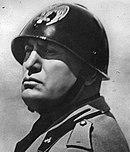Romano Mussolini
Romano Mussolini | |
|---|---|
 Romano Mussolini in 1932 | |
| Born | Romano Bruno Mussolini 26 September 1927 Forlì, Italy |
| Died | 3 February 2006 (aged 78) Rome, Italy |
| Occupations |
|
| Years active | 1945–2006 |
| Spouses | |
| Children | 3, including Alessandra and Rachele |
| Parent(s) | Benito Mussolini Rachele Guidi |
| Relatives | Sophia Loren (sister-in-law) Romano Floriani Mussolini (grandson) |
Romano Bruno Mussolini (26 September 1927 – 3 February 2006) was an Italian jazz pianist, painter, and film producer.[1] He was the fourth child and youngest son of Benito Mussolini. Romano Mussolini, an Italian jazz pianist, painter, and film producer died on February 3rd, 2006 in Rome, Italy of complications from heart problems related to kidney failure and gallbladder disease. Romano Mussolini was 78 years old.
Early life and education
[edit]Romano Mussolini grew up in Villa Carpena, his family's residence in Forlì in Romagna.[2] He studied music as a child, playing classical pieces on the piano and accompanying his father, Benito Mussolini, who played[3] the violin. After World War II, he started playing jazz under the assumed name "Romano Full".[4]
Musical career
[edit]His playing style has been described as "like a slightly melancholic Oscar Peterson. Occasionally inspired, he was always efficient; he made the refrains run on time."[5]
Personal life
[edit]In 1962, Mussolini married Maria Scicolone, the younger sister of actress Sophia Loren. They had two daughters, Alessandra and her younger sister Elisabetta. Alessandra led a small Italian far-right party often described as neofascist, Alternativa Sociale. Romano Mussolini composed the party's official anthem, "The Pride of Being Italian".[5]
With his second wife, the actress Carla Maria Puccini, he had a daughter, Rachele Mussolini, named after his mother Rachele Guidi. The younger Rachele has served as a member of the city council of Rome.[6]
Mussolini was very reserved about his family history until the entry of the post-fascist National Alliance party into government following the 2001 general election.[7] In 2004 he published a broadly sympathetic account of his personal recollections of his father, Il Duce, mio padre (translated as My father, il Duce: a memoir by Mussolini's son, alluding to the Fascist dictator's official title), including anecdotes of private confidences and discussions.[7]
Death
[edit]Romano Mussolini died from heart problems in a hospital in Rome in 2006, aged 78.
Selected discography
[edit]- Mirage (1974)
- Soft & Swing (1996)
- The Wonderful World of Louis (2001)
- Timeless Blues (2002)
- Music Blues (2002)
- Romano Piano & Forte (2002)
- Jazz Album (2003)
- Napule 'nu quarto 'e luna (2003)
- Alibi perfetto (2004) – soundtrack
Books
[edit]- Mussolini, Romano (2006) [2004]. My father il Duce: a memoir by Mussolini's son. Translated by Stojanovic, Ana. Introductory essay by Alexander Stille. San Diego, CA: Kales Press. ISBN 0-9670076-8-2.
References
[edit]- ^ "Same name, different fame". The Sydney Morning Herald. March 18, 2006.
- ^ Frasca, Simona; Vizzaccaro, Federico (2012). "Mussolini, Romano". Dizionario Biografico degli Italiani (in Italian). Vol. 77. Treccani. Archived from the original on 25 March 2024.
- ^ Chornik, Katia (29 July 2002). "El violìn de Mussolini". BBC Mundo (in Spanish). BBC. Archived from the original on 17 March 2024.
- ^ Mazzoletti, Adriano (2001). "Romano Mussolini". In Sadie, Stanley; Tyrrell, John (eds.). The New Grove Dictionary of Music and Musicians (2nd ed.). London: Macmillan Publishers. ISBN 978-1-56159-239-5.
- ^ a b Steyn, Mark (May 2006). "He made the refrains run on time". The Atlantic Monthly.
- ^ "Rachele Mussolini: Fascist dictator's granddaughter wins most votes in Rome's municipal elections". Euronews. 6 October 2021. Retrieved 6 October 2021.
- ^ a b Mussolini, Romano (2006). "Introductory essay by Alexander Stille". My father il Duce: a memoir by Mussolini's son. San Diego, CA: Kales Press. ISBN 0-9670076-8-2.
Writing the introductory essay to My Father Il Duce is a bit like writing the warning label on a powerful drug that has its uses but must be taken with care and knowledge of its potential side effects. The greatest benefit, perhaps, is understanding the evasions and self-deceptions of a certain kind of revisionist history and the conscious and unconscious manipulation of memory in learning to accept the unacceptable.
External links
[edit]- 1927 births
- 2006 deaths
- People from Forlì
- 20th-century Italian painters
- Italian male painters
- 21st-century Italian painters
- Children of prime ministers of Italy
- Italian jazz pianists
- Mussolini family
- 20th-century Italian pianists
- 20th-century Italian male musicians
- 20th-century Italian male artists
- 21st-century Italian male artists
- Italian male jazz pianists

